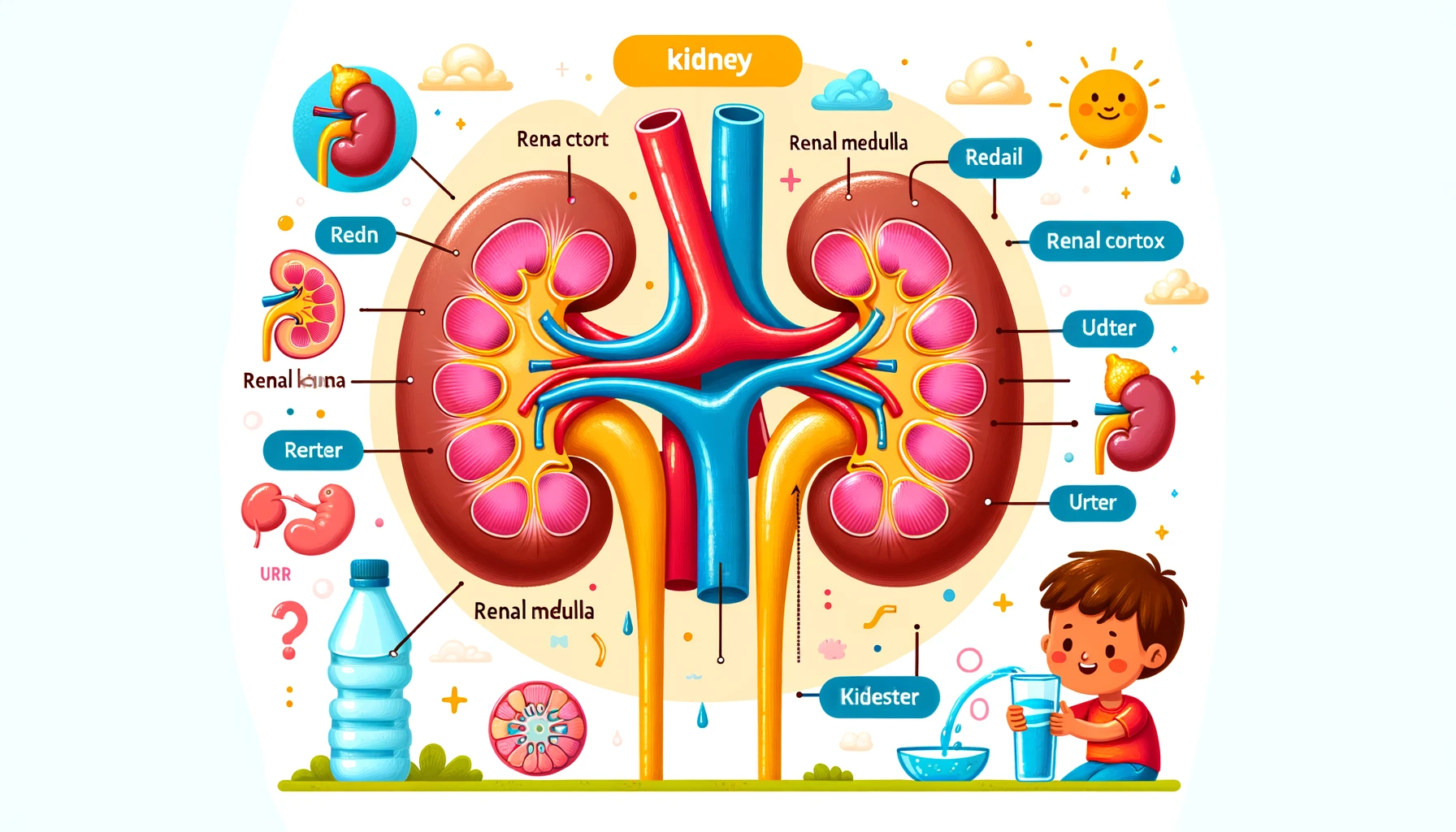How the Kidneys work: Functions and Importance
How the Kidneys work: Functions and Importance
Table of Contents
- Introduction to the Kidneys
- Anatomy of the Kidneys
- Functions of the Kidneys
- The Process of Filtration
- Regulation of Fluid and Electrolyte Balance
- Hormone Production by the Kidneys
- Common Kidney Disorders
- Importance of Kidney Health
- Conclusion
- References
How the Kidneys Work: Functions and Importance
Introduction to the Kidneys The kidneys are vital organs that play a crucial role in maintaining overall health by filtering blood, removing waste, and regulating fluid and electrolyte balance. This article explores how the kidneys work, highlighting their anatomy, functions, and importance in the body’s daily functions.
Anatomy of the Kidneys The kidneys are two bean-shaped organs located on either side of the spine, just below the rib cage. Key anatomical features include:
- Renal Cortex: The outer layer of the kidney, containing the majority of nephrons, the functional units of the kidney.
- Renal Medulla: The inner part of the kidney, composed of renal pyramids that contain the loops of Henle and collecting ducts.
- Renal Pelvis: The central part of the kidney that collects urine before it flows into the ureter.
- Nephrons: Each kidney contains about one million nephrons, which are responsible for filtering blood and forming urine.
Functions of the Kidneys The kidneys perform several essential functions that are crucial for maintaining homeostasis:
- Filtration of Blood: The kidneys filter waste products, excess substances, and toxins from the blood, forming urine.
- Regulation of Fluid Balance: The kidneys regulate the body’s fluid balance by adjusting the volume and concentration of urine.
- Electrolyte Balance: The kidneys maintain the balance of electrolytes, such as sodium, potassium, and calcium, which are vital for various bodily functions.
- Acid-Base Balance: The kidneys help maintain the body’s pH by excreting hydrogen ions and reabsorbing bicarbonate from urine.
- Hormone Production: The kidneys produce hormones that regulate blood pressure, red blood cell production, and calcium metabolism.
The Process of Filtration The filtration process in the kidneys involves several steps:
- Glomerular Filtration: Blood enters the kidneys through the renal arteries and flows into the glomeruli, where the filtration of blood begins. The glomerular capillaries filter water, ions, and small molecules from the blood into the Bowman’s capsule, forming the filtrate.
- Tubular Reabsorption: As the filtrate passes through the renal tubules, essential substances such as glucose, amino acids, and electrolytes are reabsorbed back into the bloodstream.
- Tubular Secretion: Additional waste products and excess ions are secreted from the blood into the renal tubules.
- Excretion: The final urine, containing waste products and excess substances, is collected in the renal pelvis and transported to the bladder via the ureters.
Regulation of Fluid and Electrolyte Balance The kidneys regulate fluid and electrolyte balance through various mechanisms:
- Antidiuretic Hormone (ADH): ADH, released by the pituitary gland, increases water reabsorption in the kidneys, reducing urine volume and conserving water.
- Aldosterone: This hormone, produced by the adrenal glands, increases sodium reabsorption and potassium excretion, helping to regulate blood pressure and fluid balance.
- Renin-Angiotensin-Aldosterone System (RAAS): This system responds to low blood pressure or low sodium levels by increasing the reabsorption of sodium and water, thereby raising blood pressure and fluid volume.
Hormone Production by the Kidneys The kidneys produce several important hormones:
- Erythropoietin (EPO): Stimulates the production of red blood cells in the bone marrow in response to low oxygen levels in the blood.
- Renin: Regulates blood pressure by initiating the RAAS.
- Calcitriol (Vitamin D): The active form of vitamin D, which helps regulate calcium and phosphate balance, promoting bone health.
Common Kidney Disorders Several disorders can affect the kidneys, leading to various symptoms and health issues:
- Chronic Kidney Disease (CKD): A progressive loss of kidney function over time, often caused by diabetes, hypertension, or glomerulonephritis.
- Acute Kidney Injury (AKI): A sudden loss of kidney function, usually due to injury, infection, or severe dehydration.
- Kidney Stones: Hard deposits of minerals and salts that form in the kidneys, causing pain and potential blockage of the urinary tract.
- Polycystic Kidney Disease (PKD): A genetic disorder characterized by the growth of numerous cysts in the kidneys, leading to impaired kidney function.
Importance of Kidney Health Maintaining kidney health is essential for overall well-being:
- Healthy Diet: Eating a balanced diet low in sodium, processed foods, and excessive protein can support kidney function and prevent damage.
- Regular Exercise: Physical activity helps maintain a healthy weight and reduces the risk of conditions that can affect kidney health, such as diabetes and hypertension.
- Hydration: Drinking plenty of water helps the kidneys filter waste and maintain fluid balance.
- Avoiding Toxins: Limiting the use of medications and substances that can harm the kidneys, such as nonsteroidal anti-inflammatory drugs (NSAIDs) and excessive alcohol.
- Regular Check-ups: Routine medical check-ups and kidney function tests can help detect kidney issues early and prevent complications.
Conclusion Understanding how the kidneys work is vital for maintaining overall health. The kidneys’ functions in filtering blood, regulating fluid and electrolyte balance, and producing essential hormones are crucial for homeostasis. By adopting healthy lifestyle habits and being mindful of potential kidney stressors, individuals can support their kidneys’ function and prevent common kidney disorders.

<ⓒ WizardMedics (wizardmedics.com)>






